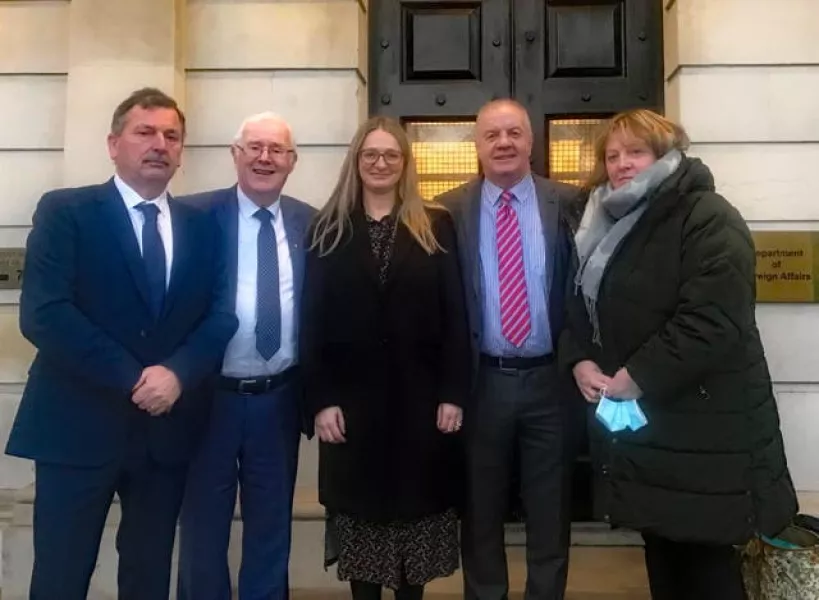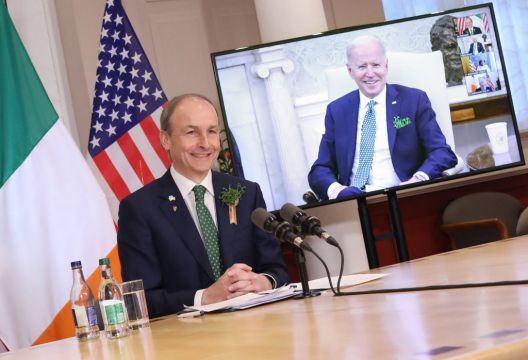A cross-community group of Troubles victims has pressed the Taoiseach to raise the British government’s legacy proposals with US president Joe Biden.
Micheál Martin met the Truth and Justice Movement in Dublin on Thursday to discuss their opposition to London plans to introduce an amnesty on prosecutions related to the conflict.
He told the group that the Irish Government has “consistently engaged with the US on legacy issues and will continue to do so”, his spokesman said.
Mr Martin is likely to travel to Washington to meet president Biden in March for the traditional St Patrick’s Day visit, which has not taken place in person for the past two-years due to the coronavirus pandemic.
After the meeting, victims’ campaigners said the Taoiseach had offered them his full support and that he “totally rejects” the plan.
Campaigner Raymond McCord said: “He said he totally rejects the proposals, that he supports us in it.
“We spoke about American involvement. I raised it. We would like to see the Americans involved, I want it to be brought to the attention of Joe Biden.
“The full support is there for us, he agrees with everything that we’re saying.”
A spokesperson for Mr Martin told the PA News Agency: “The Taoiseach met with representatives from a victims of the Troubles group today to discuss their concerns in relation to legacy issues.
“He told them that we have consistently engaged with the US on legacy issues and will continue to do so.
“Ireland has voiced strong opposition against unilateral action on a statute of limitations which has been opposed by parties across Northern Ireland.”
The UK government wants to bring in a statute of limitations on future prosecutions of military veterans and ex-paramilitaries for Troubles incidents predating April 1998.
The move has been opposed by all political parties on the island of Ireland.
The group of victims, including Michael Gallagher, Raymond McCord, Kate Nash and Cathy McIlvenny, have long campaigned against the proposals, and recently met with Foreign Minister Simon Coveney.
Mr Coveney and the Taoiseach have accepted an invitation to meet the group in Belfast.

Mr McCord praised the Taoiseach following their hour and a half long meeting.
“He agreed that any proposals have to have a victims led approach, he was in total agreement with that,” he said.
“They’ll be engaging with the British Government. We’ll be kept informed of what’s happening. That will happen, that’s given us hope and confidence too.
“It was good to sit with a man, and you can know by the way he’s speaking to you that he’s telling the truth and he’s not just saying it.
“We all agreed that the meeting was above our own expectations, it went that well.”
In July last year, the UK government published a command paper outlining its intention to prohibit future prosecutions of military veterans and ex-paramilitaries for Troubles incidents pre-dating April 1998.
The proposals, which British prime minister Boris Johnson said would allow Northern Ireland to “draw a line under the Troubles”, would also end all legacy inquests and civil actions.

They were strongly condemned by the Taoiseach in the Dáil last month.
“It would be totally unacceptable, it would be a betrayal of the victims of all violence,” he said.
“There is no sense here for a lot of people, a lot of victims, of closure, of answers in terms of who did what.
“Many, many people feel that they’ve been forgotten about, or the loss of their loved ones has been completely forgotten about, and there is no balance in terms of how we approach that.
“I believe that British Government has dragged its feet for too long on legacy in my view.”







